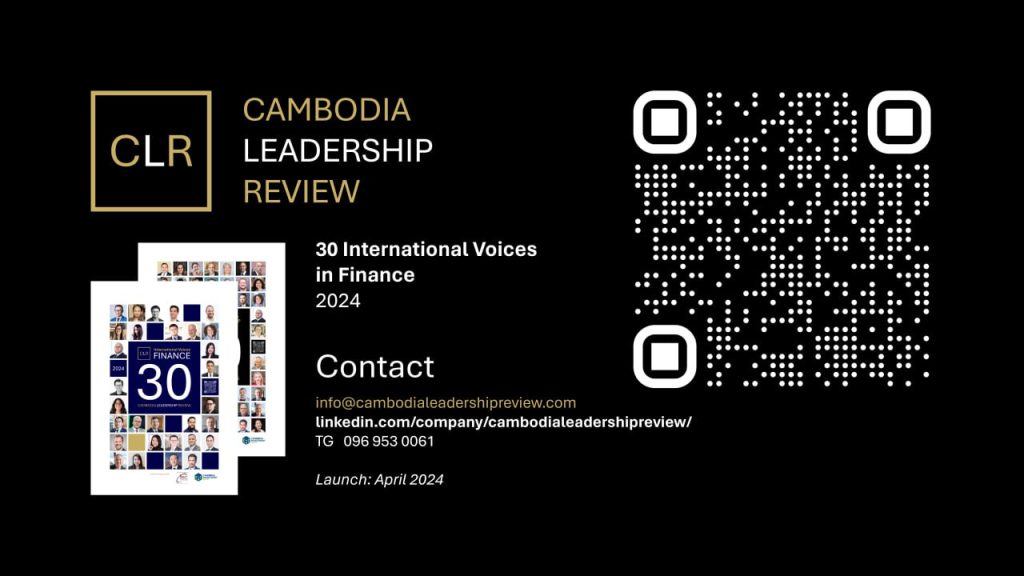Cambodia Investment Review
Over the past two decades, Cambodia has significantly evolved its approach to attracting foreign direct investment (FDI), creating both opportunities and challenges for foreign businesses operating within the nation.
In the Cambodia Leadership Review’s Top 30 in Finance 2024 magazine, Stephen Higgins speaks with Harrison White about the Cambodian business landscape, highlighting key sectors ripe for investment, ongoing challenges for foreign corporations, and prospective trends that could shape the country’s economic future.
CLR: Can you highlight how Cambodia’s approach to attracting foreign direct investment has changed over the last two decades and its impact on foreign businesses operating here?
SH: Cambodia has been really supportive of foreign investment over the last two decades. In the early years the business environment was probably a little more laissez-faire than it is now, and even if there were rules on the books, they weren’t always enforced. That’s changed quite a bit now, which is appropriate, but the implementation can still leave a bit to be desired and that can create uncertainty for investors. When I talk about implementation, I’m mainly talking about things like penalising businesses for breaching obscure rules that had never been enforced before, and the tax audit process. But I think the new government recognises these issues, and I really like what I’ve seen so far from the Manet government.
CLR: What sectors currently present the most significant growth and investment opportunities for foreign investors in Cambodia, and how is the country enhancing its appeal for sustainable and technology-driven investments?
SH: In a high growth economy like Cambodia, there’s going to be attractive investment opportunities in just about every sector. It’s probably easier to say what isn’t going to be attractive, and property is very much at the top of that list, perhaps with the exception of industrial property. Banking isn’t attractive if you’re looking at a greenfields opportunity, as there are just too many existing players, but buying a large existing bank or MDI would still make sense. From a technology perspective, a lot of people might look at Cambodia and have doubts, but they just need to look at how quickly the country moved from almost 100% cash payments to very very high levels of digital payments.
CLR: What major challenges do foreign businesses face in Cambodia today, and what strategies or government policies are effective in helping them overcome these obstacles?
SH: The challenges can very much depend on what line of business you’re in. But two of the more general ones are dealing with corruption, and dealing with the tax audit process. The new government seems quite focused on both these areas, so I do expect they’ll improve a lot in the coming years. We also sometimes see challenges when foreign businesses enter the country via a JV, often using a local partner for reasons like “they have connections”. Cambodia allows 100% foreign ownership for just about everything outside of landed property, and it’s better to be in as much control of your own destiny as possible. Bringing in a local partner for reasons like “connections” might be helpful at the start, but can also work against you if things go wrong.
CLR: Looking forward, what trends or sectors do you believe will drive Cambodia’s economic growth and FDI in the coming years, and how should foreign businesses prepare to align with these developments?
SH: It might surprise a lot of people, but I’m pretty bullish on tourism, particularly if the government gets the settings right. Tourist numbers are still around 40%-50% below where they were pre-covid, so there’s a lot of upside just from getting back to where we were. Cambodia has a great tourism product, in terms of the amazing Angkor complex, and some wonderful islands. They just haven’t been marketed very well in the past to an international audience. But as I said earlier, in a high growth economy like Cambodia, there’s going to be opportunities in most sectors, whether that is health care, agri-processing, firms that support infrastructure construction, and banking for those that can achieve scale.
Download Cambodia Leadership Review Top 30 Finance 2024 here.






